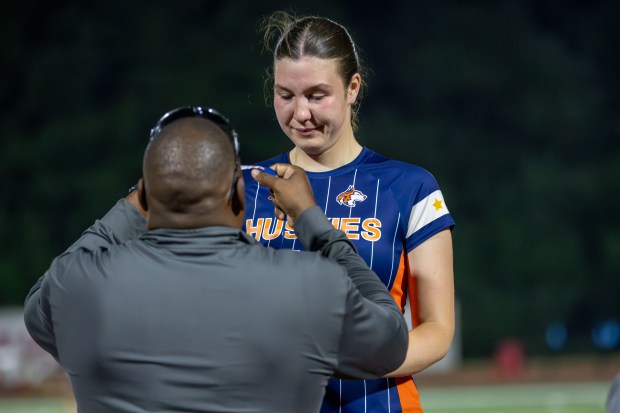Cook County Board President Toni Preckwinkle is projecting a $218 million budget gap next year, largely driven by raises she granted to county employees and the resulting growth in needed pension payments.
While Preckwinkle’s finance team said this week it’s “a little too early” to say how that gap will be closed, they also projected the county is on track to end 2024 with a surplus of about $367 million, according to figures released as part of the county’s mid-year forecast.
County policy is to avoid covering ongoing expenses with one-time revenues and instead use extra money to address one-time costs in coming budgets or long-term liabilities.
The $218 million gap, while higher than the last three years, represents a tiny slice of this year’s $9.26 billion budget.
The shortfall was small enough for Preckwinkle to again promise to avoid layoffs, program cuts, or tax hikes next year to make up the difference.
“I won’t lose sleep over that,” Preckwinkle told reporters of the gap on Tuesday. “We’ve seen worse.”
The expected surplus at the end of this year is driven in part by inflation, which is fueling higher sales tax receipts and investment income. CountyCare, the county-run Medicaid health plan, is expected to bring in $504 million more dollars than anticipated. Improved collections on insurance claims at Cook County Health are also expected to boost the health system’s surplus as well, officials said.
But a 5% cost of living increase for county employees — both union and non-union — kicking in next June is driving up expenditures. Those raises will cost an estimated $94 million, budget director Kanako Ishida Musselwhite said, while associated health expenses will cost an additional $10 million, and pension payments will also rise by $36 million.
Despite those raises and additional retention bonuses for certain roles, the county’s struggles to fill vacancies continue. About 4,000 positions remain empty across county government, roughly the same amount as last year. Most are at the Cook County Health, which runs the flagship Stroger and Provident Hospitals, several clinics, and has been the lead healthcare provider responding to the migrant mission.
Despite struggles to hire, CCH is a bright spot in the forecast: for the first time since Preckwinkle took office in 2010, the health fund is not forecasting any revenue shortfalls or cost overruns in 2025.
Of the $1 billion the county received from the federal government through the American Rescue Plan Act, about $200 million propped up county operations. The rest, more than $800 million, was set aside for 73 community programs. That includes the county’s guaranteed income pilot, medical debt elimination, violence reduction, and several transportation and infrastructure projects.
So far, just $275 million of those community programming dollars have been spent. $319 million has been obligated — meaning the county has legal agreements in place — but $212 million has not. All $212 million must be obligated before the end of this year and spent by the end of 2026, or risk being taken back by the feds.
“There is a fiscal cliff,” Preckwinkle acknowledged, but she said the county has been planning for it, establishing a $166 million reserve fund last year to provide continued funding for certain ARPA-funded programs after 2026.
The county also has an “equity fund that could be used to help support some of these programs. So there are lots of options available to us. We’ve told our departments and bureau chiefs that they should be looking for external sources of support for these initiatives starting right away, given the fact that we know that the federal resources come to an end at the end of 2026,” Preckwinkle said.
Of the 73 community projects launched thanks to ARPA dollars, 45 of the project leaders heading them up said they anticipated their programs would keep running after 2026. The county is surveying community members this summer about which ARPA-initiated projects they believe should continue.
A virtual public hearing on the preliminary forecast will be held July 17 at 6 p.m.
aquig@chicagotribune.com



